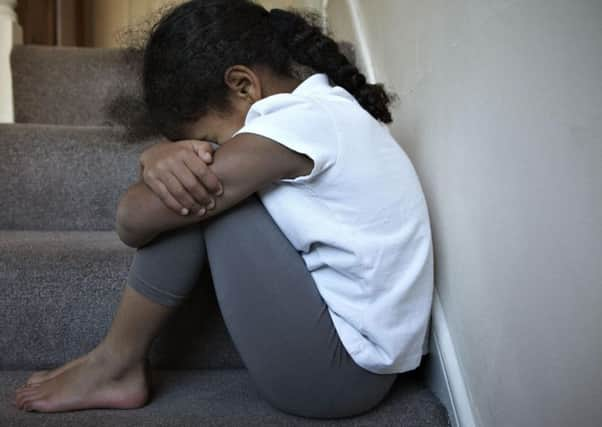'˜I fled Africa to escape the threat from my own family'


The bank worker fled Sierra Leone after being dragged from her home in the night, and is now fighting to make a new life in Preston.
Lucy – not her real name – is living as an asylum seeker, waiting to find out if she is eligible for a visa, so her family can join her.
Advertisement
Hide AdAdvertisement
Hide Ad“I can’t think what will happen if I don’t get it,” she says, with fear in her eyes.
Lucy was brought up by her grandmother, believing her mother had left the country when she was a child.
But, when her grandmother died, she discovered she had been protecting Lucy from being subjected to female genital mutilation (FGM), which had been inflicted on her four sisters.
The process involves removal of part or all of the external genitalia for non-medical reasons. The agonising practice is illegal in the UK, but is is prevalent in parts of Africa, the Middle East and Asia.
Advertisement
Hide AdAdvertisement
Hide AdLucy recalls: “When my grandmother died in 2010, that’s when I got to know my mother.
“She was pestering me and saying I must do the FGM, if I didn’t do it, I would be a disgrace.
“There are so many complications, people have died of it, you can get HIV, some people can’t get pregnant because of it.”
Lucy says there is very little protection for women refusing FGM, as the practice is seen as “tradition”.
Advertisement
Hide AdAdvertisement
Hide AdShe explains: “When my grandmother died, I started having problems, nobody could save me.” One night as she and her husband returned home, she was grabbed by 12 women and taken to a secret location, where FGM was to be performed.
She was blindfolded but managed to escape by asking to use the toilet and running away into the night.
She remembers: “The drums were there for when you scream so nobody can hear, so I used that opportunity to escape.
“But I didn’t go home, I went to a friend’s house and I was in hiding.
Advertisement
Hide AdAdvertisement
Hide Ad“I was outcast, I was afraid, I couldn’t move from place to place because I never knew how they were going to get hold of me.
“My husband said, ‘You need to get out of the country for security’; my life was at stake.”
Lucy applied to the UK Embassy in Sierra Leone, where she was granted a visa to fly to Britain to visit the country in 2011.
She was about to apply for asylum but received a call to say her husband had been in a near-fatal car accident and she had to return home.
Advertisement
Hide AdAdvertisement
Hide AdShe was told he was on a life support machine, and returned to Sierra Leone in hiding to be with him. She says: “We hoped, and with God’s help, he recovered from it.”
After about six months, Lucy was discovered by her mother, who tricked her into believing she wouldn’t force her to have the procedure, but it turned out she was “baiting” her.
She remembers: “They gave me a call and said she was in the hospital in my home town, she was sick and I needed to get some medicine and food to take to her.
“When I got to my home town, it was a big trap.
“I went to my house, I saw the ladies there, I was put on my back and they were hiding around the house.
Advertisement
Hide AdAdvertisement
Hide Ad“I said, ‘Let me get to the hospital’ and they just got hold of me, about eight of them.
“I was really fighting with them and said I didn’t want to do it, but they said, ‘It’s a tradition, you can’t avoid it.’
“I was fighting, I don’t know what was happening, I found myself in the hospital.”
Luckily, Lucy had fainted in the struggle and was taken to hospital, avoiding the FGM.
Advertisement
Hide AdAdvertisement
Hide AdFearing the women would come back, she ran away from the hospital. But she and her husband had to move away, and she couldn’t even have a mobile phone for fear of being tracked down.
The pair began saving money ready for her to return to the UK, when Ebola broke out, while Lucy was pregnant, in 2014.
She says: “My doctor died from Ebola, two of my friends died, I saw dead bodies in the street. It was very serious, I was pregnant, so I had to flee for my life.
“Immediately I came, I bought a ticket and came on a plane, I was pregnant without my husband. It was really terrible, I can’t explain it.
Advertisement
Hide AdAdvertisement
Hide Ad“I lost contact with my husband for that time – he went to the provinces to meet his uncle.
“I couldn’t get hold of him, I was in a really terrible state, I was in fear for my life and I just had to flee from the country.”
Lucy arrived at Heathrow, knowing nobody and heavily pregnant, but managed to get help from a woman she heard speaking her language.
After going to the Home Office and asking to seek asylum, she was sent to a London hostel, where she gave birth shortly afterwards.
Advertisement
Hide AdAdvertisement
Hide AdHer journey then took her and her baby son to Bolton, then eventually to Preston, where she is being helped by the Red Cross. She awaits her asylum hearing in May.
She says, hopefully: “If I get asylum, then my husband can come.
“I would like to stay here in Preston. People have welcomed me and I’ve had no problems.”
Lucy, who also has an eight-year-old son, says: “It’s stressful. Sometimes I feel sad because I’m missing my family, my son and my husband.”